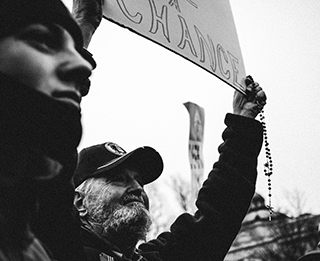One of the most remarkable differences between the social protests of the 1960’s and those of today is that the former were done in concert with, and often under the explicit leadership of, religious people. One has only to think of the crucially important role played by the Rev. Dr. Martin Luther King and so many of his colleagues and disciples in the civil rights demonstrations fifty and sixty years ago. But we don’t find today the same concert between those agitating for social change and the religious leadership. There are many reasons for this phenomenon. Perhaps the most important is simply that the number of people who subscribe to religion, especially in the ranks of the young, has precipitously dropped in our society. But I also think that there is something subtler at play as well, and I have to put on my philosopher’s hat to articulate it.
In the 1960’s, Dr. King and company were certainly using Biblical ideas and terminology to express their critique of injustice and their longing for a righteous society, but they were also more or less confident that, in doing so, they would find a receptive audience among those trained in the political tradition that we might characterize as “classical liberalism.” This, broadly speaking, is the public philosophy shaped by such figures as Thomas Jefferson, John Stuart Mill, and especially John Locke. As is evident in some of their principal texts—Jefferson’s Declaration of Independence, Mill’s On Liberty, and Locke’s Two Treatises of Government, for example—we find a clear sense that human reason can discern certain fundamental moral objectivities, including and especially the truth that all people are endowed with rights and dignity. Furthermore, we find the conviction that objective theoretical truth exists and that it is accessible through the intellectual give-and-take fostered by the political practice of allowing freedom of speech.
Though there were clear points of demarcation between classical liberalism and Christianity (indeed all of the figures referenced above were, to varying degrees, opposed to Biblical religion), nevertheless on these central points, people trained in the Scriptural tradition could find common ground with liberals. Revisit Dr. King’s “I Have a Dream” speech to see a master class in how to weave the two traditions together. King used soaring language from the prophet Isaiah, but then effortlessly related it to Jefferson’s political philosophy and even to the lyrics of our patriotic songs. Another excellent example of someone who could link together the two schools of thought was John Paul II. In numerous texts and speeches, the great Pope happily adopted the human rights language of classical liberalism and lifted it up into the higher context of a Biblical anthropology.
The absence of religious leadership in the protest movements of the present moment, and indeed the hostility to religion exhibited by many of the protesters, are a function of a major shift in the culture. The philosophy that undergirds the “woke” perspective is not classical liberalism, but rather postmodernism, indeed a fairly nasty strain of it. The voices behind much of the opposition leadership today are not those of Locke and Jefferson, but rather of Karl Marx, Friedrich Nietzsche, and Michel Foucault—and this makes a crucial difference. Marx, for instance, denies the existence of a stable human nature, insisting that the term simply means “the sum total of one’s social relations.” Nietzsche asserts the non-existence of God and hence the relativity of any claim to objective truth or moral value. In the space opened up by this metaphysical collapse, the “will to power,” he argued, can and should assert itself. And Foucault—probably the most influential of the three—understands the ideas and forms of discourse of a given society to be nothing more than the cynical means by which a dominant group maintains itself in power. A key practical implication of this theorizing is that the free speech so dear to classical liberalism as a means of coming to truth is appreciated as a means of oppression. And the appeals that religious people used to make to the rights of the individual are typically seen by postmodern theorists as unjustified and ultimately manipulative. As a result of all of this, it is exceptionally difficult for the religiously motivated to get any traction with those formed by postmodernism, and vice versa. The two groups tend to stare at one another across an intellectual abyss.
But all is not lost. If I might suggest one possible bridge between the two worlds, it would be a shared passion for justice. Despite their consistent claim that truth and value are relative and that language is but a subtle means of domination, the schools formed by Marx and Foucault would certainly hold that the oppression of one class of people by another is unjust. To that degree, they inescapably hold to something like an objective moral value, and they would seem to agree that language which articulates that value is something other than merely manipulative. And here, the Biblical person can indeed find common ground, for beginning with the Hebrew prophets and coming directly through Jesus himself and then into the great Christian tradition, we find the conviction that seeking justice is congruent with the will of God.
So the conversation between the religious and the revolutionary is tougher today than it was sixty years ago, for a philosophical system more alien to religion than was classical liberalism has come to hold sway in revolutionary circles. But I would urge my co-religionists not to give up. A love for justice might be the bridge.
